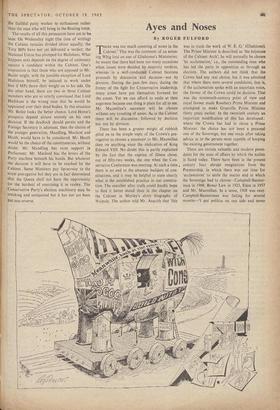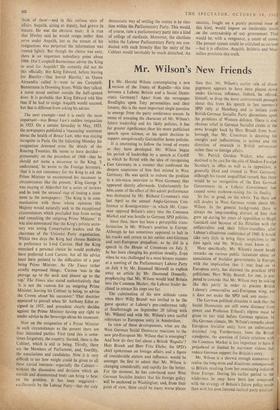Ayes and Noses
By ROGER FULFORD HERE was too much counting of noses in the Cabinet.' This was the comment of an amus- ing Whig lord on one of Gladstone's Ministeries; he meant that there had been too many occasions when issues were decided by majority verdicts, whereas in a well-conducted Cabinet business proceeds by discussion and decision—not by division. During the past few days, during the frenzy of the fight for Conservative leadership, many noses have put themselves forward for the count. Yet we can afford to smile at their eagerness because one thing is plain for all to see. Mr. Macmillan's successor will be chosen without any counting of noses. As in the Cabinet there will be discussion, followed by decision but not by division.
There has been a greater weight of rubbish piled on to the simple topic of the Crown's pre- rogative to choose a successor to Mr. Macmillan than on anything since the abdication of King Edward VIII. No doubt this is partly explained by the fact that the caprice of illness chose, out of fifty-two weeks, the one when the Con- servative Conference was meeting. At such a time there is no end to the amateur builders of con- stitutions, and it may be helpful to state clearly what is the established practice in our constitu- tion. The searcher after truth could hardly hope to find it better stated than in the chapter on the Cabinet in Morley's short biography of Walpole. The author told Mr. Asquith that 'this was in truth the work of W. E. G.' (Gladstone). The Prime Minister is described as 'the keystone of the Cabinet Arch'; he will normally be chosen 'by acclamation,' i.e., the outstanding man who has led the party in opposition or through an election. The authors did not think that the Crown had any real choice, but it was admitted that where there were several candidatei, that is, if the acclamation spoke with an uncertain voice, the favour of the Crown could be decisive. That was the nineteenth-century point of view and royal favour made Rosebery Prime Minister and attempted to make Granville Prime Minister thirty years earlier. In the twentieth century an important modification of this has developed: where the Crown has had to chose a Prime Minister, the choice has not been a personal one of the Sovereign, but one made after taking advice as to the person most capable of keeping the existing government together.
There are certain valuable and modern prece- dents for the state of affairs by which the nation is faced today. There have been in the present century four abrupt resignations from the Premiership, in which there was not time for 'acclamation' to settle the matter and in which the Sovereign had to choose—Campbell-Banner- man in 1908, Sonar Law in 1923, Eden in 1957 and Mr. Macmillan. In a sense, 1908 was easy. Campbell-Bannerman was failing for several months-1 put politics on one side and never think of them'—and in this curious state df affairs Asquith, acting as deputy, had grown in stature. He was the obvious man: it is true that Morley said he would resign rather than serve under Asquith, but as the stream of his resignations was perpetual the information was treated lightly. But though the choice was easy, there is an important subsidiary point about 1908. Did Campbell-Bannerman advise the King to send for 'Asquith? He certainly did not do this officially. But King Edward, before leaving for Biarritz—`that horrid Biarritz,' as Queen Alexandra called it—went to see Campbell- Bannerman in Downing Street. While they talked, a nurse stood sentinel outside the half-opened door. It is probable that King Edward told him that if he had to resign Asquith would succeed, but that is different from asking his advice.
The next example—and it is easily the most important—was Bonar Law's sudden resignation in 1923. On a certain Saturday in May, 1923, the newspapers published a 'reassuring' statement about the health of Bonar Law, who was staying incognito in Paris. On the following Monday his resignation drowned even the shindy of the Roaring Twenties. He seems to have decided— presumably on the precedent of 1908—that he should not name a successor to the King. 'I understand,' he wrote to the Foreign Secretary, 'that it is not customary for the King to ask the Prime Minister to recommend his successor in circumstances like the present.' King George V was staying at Aldershot for a series of reviews and he took the unusual step of issuing a state- ment to the newspapers: 'The King is in com- munication with those whose opinions His Majesty would naturally seek in the exceptional circumstances which precluded him • from seeing and consulting the outgoing Prime Mini,ster.' It was also announced that the King's private secre- tary was seeing Conservative leaders and the chairman of the Unionist Party organisation. Within two days the King had chosen Baldwin in preference to Lord Curzon. Had the King exercised a personal choice he would probably have preferred Lord Curzon, but all his advice must have pointed to the difficulties of a peer being Prime Minister. As The Times rather cruelly expressed things: Curzon 'was in the peerage up to the neck and almost up to the top.' The Times also stated authoritatively that 'it is not the custom for an outgoing Prime Minister, leaving his Cabinet in being, to advise the Crown about his successor.' That doctrine appeared to prevail when Sir Anthony Eden re- signed in 1957, and precedent clearly decides against the Prime Minister having any right to tender advice to the Sovereign about his successor.
Now on the resignation of a Prime Minister in such circumstances as the present there are four interested parties. First (and this is some- times forgotten), the country. Second, there is the Cabinet, which is still in being. Thirdly, there are the Members of Parliament, and, fourthly, the associations and candidates. Now it is very difficult to see how weight could be given to all these varied interests—especially the Cabinet-- without the discussion and decision which an outside and disinterested body can bring to bear on the problem. It has been suggested— vociferously by the Labour Party—that the only democratic way of settling the matter is by elec- tion within the Parliamentary Party. This would, of course, turn a parliamentary party into a kind of college of cardinals. Moreover, the elections within the Labour Parliamentary Party are con- ducted with such ferocity that the unity of the Cabinet would inevitably be much disturbed. An election, fought on a purely personal issue of this kind, would impose an intolerable strain . on the comradeship of any government. That would be, with a vengeance, a count of noses. The present system could be criticised as curious —but it is effective. Asquith, Baldwin and Mac- millan proclaim this truth.



































 Previous page
Previous page